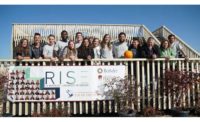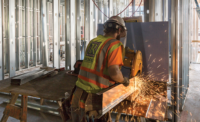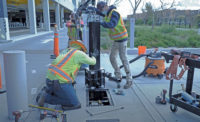The idea for the company logo, a stylized path through a wheat field, came early in the formation of Denver-based electrical contractor Weifield Group Contracting, says the firm’s head of business development and founding partner Karla Nugent. The four founding partners, all from varied backgrounds, launched the company early in 2002 knowing they would need to bring something different to the market.
“We were making the way through the fields of business to deliver electrical solutions in a new and innovative way for our clients,” Nugent says.
Since its founding, the company has grown steadily in the regional market, landing larger and larger projects and working with builders throughout western Colorado as well as Wyoming and Texas. It is one of the first electrical contractors in the region to have completed LEED Platinum and net-zero projects. With nearly 500 employees and four divisions—service, special projects, construction and water and infrastructure—Weifield generated $76.6 million in revenue during 2017, up from $59.2 million in 2016.
In December, Weifield acquired a majority stake in IDI Electric of Austin, Texas.
“This new alliance was a three-year venture signifying successful completion of our strategic goal and opening up a host of opportunities for Weifield in the Texas market,” says Seth Anderson, Weifield Group CEO and founding partner. “We met with the former ownership numerous times over the last months and were pleased to find a company that aligned directly with our core values of people, process, community and trusting relationships.”
With the firm’s expansion into Texas, Anderson says Weifield is staying on its planned growth trajectory. “In the next five to 10 years, we want to move into more markets, and we’ll diversify into places where we think we have something to offer,” he says.
A Partnership in Difficult Times
Along with Nugent and Anderson, Weifield’s founders include Pete Farreny and James Selecky, both master electricians. Farreny now serves as COO and Selecky is chief special projects officer. Anderson has a degree in construction management and had worked with Farreny and Selecky in different capacities at 360networks, a fiber-optics installer that stumbled during the dot-com crash. They came to know Nugent, who was working as a project manager building data centers around the country. She says work in that sector slowed greatly after the 9/11 attacks.
“We felt like we knew what the industry was lacking and what we could bring to it,” says Anderson.
“We felt like we knew what the industry was lacking and what we could bring to it.”
– Seth Anderson, CEO, Weifield Group Contracting
“I wanted to look at how we could create value for the customer and the contractors,” Nugent says. “I’d gone to college here and had been working on data center projects here and just started leveraging the relationships I had. I started tracking all the projects that were happening in the area.”
Anderson says the company found early work in the retail sector, which was still strong at the time.
“Eventually, we took on some bigger federal jobs and were successful. The first few years [the four partners]only took what we needed to survive and put as much as we could back into the company,” Anderson says.
He says the company found early success in the solar market as well, and in recent years has seen growth in its health care sector. Nugent adds that the population growth in the Denver area has meant more work in water and wastewater projects.
The company recently completed work on a tenant improvement for Kaiser Permanente in Denver’s RiNo district. The facility is a center of high-tech innovation where clinical providers interested in exploring new methods of care can rapidly test concepts and technology. Currently, Weifield is working with Mortensen Construction on a design-build, three-story, 115,000-sq-ft laboratory on the Anschutz Medical Campus.
Weifield recently completed work on the Northglenn Wastewater Treatment Plant Headworks and Clarifier project in Brighton, Colo. The company is currently working with Glacier Construction on new pump stations and tanks with medium-voltage equipment for the East Cherry Creek Valley Water & Sanitation District.
Building Value
Offering a range of technical specialties has been key to the company’s success, according to Nugent. Weifield utilizes Bluebeam Revu, BIM 3D dynamic software, Trimble Systems Robotic Stations and has made significant investments in prefabrication work.
Weifield has a 9,600-sq-ft prefab facility in Denver, where crews assemble component sections as soon as drawings are available. “It’s a way we can push the schedule,” Nugent says. “Anything we can do before we get on site, we’ll do.”
Nugent says prefabrication allows for construction in a controlled, safe environment. It has also proven valuable on projects in busy, constricted sites around Denver where parts can be delivered during off-hours.
The prefab facility and resulting process also has proved valuable as a training ground for new or developing employees, another core value for the company.
Working with the Rocky Mountain chapter of the Independent Electrical Contractors, Weifield has developed one of the largest apprenticeship programs in Colorado and offers four-year paid apprenticeship programs. Nugent says the ongoing training and education for employees is a priority.
“We are constantly training people. When new codes come out, we want to make sure everyone is up to speed on them,” she says.
Tim Kretzschmar, vice president of building and Colorado division manager for San Francisco-based Swinerton Builders, says Weifield worked as the electrical design-build subcontractor on the recently completed Country Club Towers project in Denver.
“They did a lot of prefab work for that project and were very helpful in preconstruction keeping the project on budget,” he says. “They were probably the best sub on the site. We didn’t have to worry about them. They just went in and got the job done. Their people really cared about doing the job well.”
Community Connections
Community involvement has been a core value of Weifield from the start.
“People like working somewhere they are valued and that has values,” says Nugent. “We want our people to be passionate not just about our work but about our community.”
Weifield supports and encourages employees to volunteer with groups working in four categories: head of household, women and children, the U.S. military, and the disabled and less fortunate. The company has dedicated funds that can be used for donations to various charities and regularly participates in fundraising for local nonprofits.
“We’ve worked with some charities who have people who might have had problems; we’ve put them through our training program and got them working, and now they are supporting themselves or are the head of a household,” Nugent says.
Kretzschmar says he thinks Weifield’s commitment to employees and improving the community has paid off. “[Weifield is] really passionate about workforce development, and I think that is why they are so good at the prefab work and construction in the field,” he says.
Weifield has supported individuals from charities such as the Denver Rescue Mission, Stout Street Foundation, Peer 1 Program and the Wounded Warrior Project, among others.
The company recently worked with a collection of design and engineering students from the University of California, Berkeley, and the University of Denver to design and build a net-zero home. The project won an ENR Mountain States Best Projects award in the green project category this year. The home was donated to Habitat for Humanity.






